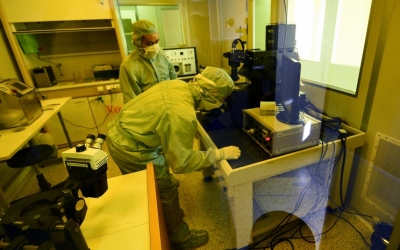- Latest news▼
-
16:41, April 15 Cell: in carriers of defective BRCA2 gene, sugar consumption increases cancer risk

-
15:04, April 15 305 cases of measles recorded in Armenia so far in 2024

-
14:38, April 15 Food and Environmental Virology: tea contributes to effective coronavirus control

-
12:41, April 15 Daily Mail: vitamin A, B3 and E supplements can be dangerous

-
10:56, April 15 Diabetes Care: evening physical activity is good for the heart

-
08:27, April 15 Women are more susceptible to blood loss and death during bypass surgery than men, researchers say

-
18:42, April 13 WHO: Nigeria pioneers revolutionary meningitis vaccine

-
16:43, April 13 One-third of women experience menstruation-related migraines, most often during premenopause - study

-
14:37, April 12 Pediatrics: Hypoglossal nerve stimulation implant helps with sleep apnea

-
12:13, April 12 Health minister: Simulation educational center will be created, assisted reproductive technology capacity will increase in Armenia

-
17:03, April 11 BMJ: antidepressant injection 4 times reduced risk of severe postpartum depression

-
11:35, April 11 Health minister: Number of hard-to-reach medical services within state funding scope increased in Armenia in 2023

-
16:10, April 10 Breathing therapy, which is so popular in the world, is starting to spread in Armenia

-
21:36, April 9 Frontiers: sun exposure destroys skin microbiome

-
17:24, April 9 EClinicalMedicine: depression increases the lethality of breast cancer

All materials
Viral treatment could be effective against melanoma

A genetically engineered and harmless form of the herpes virus is showing promise in slowing the progression of melanoma, researchers report.
The treatment works by killing cancer cells and triggering the immune system to attack tumors, researchers said. The study, published May 26 in the Journal of Clinical Oncology, was funded by drug maker Amgen, which is developing the therapy.
The researchers said their study of 436 patients worldwide is the first phase 3 clinical trial to show that so-called "viral immunotherapy" -- using a harmless virus to spur an immune response against cancer -- can benefit cancer patients.
A phase 3 trial, typically the last and largest, is undertaken after earlier research indicates a treatment is already safe and effective in a small group.
The patients in this trial had aggressive, inoperable melanoma. Each received either an injection of the viral therapy -- called Talimogene Laherparepvec (T-VEC) -- or a "control" immunotherapy.
T-VEC is a modified form of herpes simplex virus type-1 that has had two of its genes removed so that it can't replicate in healthy cells, the research team explained. Instead, T-VEC multiplies inside cancer cells and bursts them from within. It also produces a molecule that stimulates the immune system to attack and destroy tumors.
Not everyone benefited from the therapy, however. According to the study, treatment response of more than six months occurred in only about 16 percent of patients in the T-VEC group. However, that was still much better than the 2 percent response rate of those in the group that didn't receive the treatment, the researchers reported.
Also, some patients in the T-VEC group had a response lasting longer than three years, the researchers noted.
"There is increasing excitement over the use of viral treatments like T-VEC for cancer, because they can launch a two-pronged attack on tumors -- both killing cancer cells directly and marshalling the immune system against them," said Kevin Harrington, U.K. trial leader and professor of biological cancer therapies at the Institute of Cancer Research in London.
"Because viral treatment can target cancer cells specifically, it tends to have fewer side effects than traditional chemotherapy or some of the other new immunotherapies," Harrington said in an institute news release.
Responses to T-VEC were strongest in patients with less advanced cancers and in those who had not received any prior treatment, Harrington said. This highlights the potential benefits of T-VEC as a first-line treatment for patients with advanced melanoma that cannot be surgically removed, the researchers said.
Average survival among patients with stage 3 and early stage 4 melanoma was 41 months for those who received T-VEC, and about 22 months for those in the control group.
Follow NEWS.am Medicine on Facebook and Twitter
- Video
- Event calendar
- Archive
- Most read
month
week
day
- Breathing therapy, which is so popular in the world, is starting to spread in Armenia 1786
- Frontiers: sun exposure destroys skin microbiome 1336
- EClinicalMedicine: depression increases the lethality of breast cancer 1335
- FEV: Black tea inactivates SARS-CoV-2 in saliva 1333
- BMJ: antidepressant injection 4 times reduced risk of severe postpartum depression 1109
- Health minister: Number of hard-to-reach medical services within state funding scope increased in Armenia in 2023 1070
- Pediatrics: Hypoglossal nerve stimulation implant helps with sleep apnea 970
- Health minister: Simulation educational center will be created, assisted reproductive technology capacity will increase in Armenia 934
- WHO: Nigeria pioneers revolutionary meningitis vaccine 767
- One-third of women experience menstruation-related migraines, most often during premenopause - study 747
- Women are more susceptible to blood loss and death during bypass surgery than men, researchers say 403
- Food and Environmental Virology: tea contributes to effective coronavirus control 387
- Daily Mail: vitamin A, B3 and E supplements can be dangerous 382
- Diabetes Care: evening physical activity is good for the heart 355
- 305 cases of measles recorded in Armenia so far in 2024 334
- Find us on Facebook
- Poll





